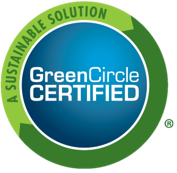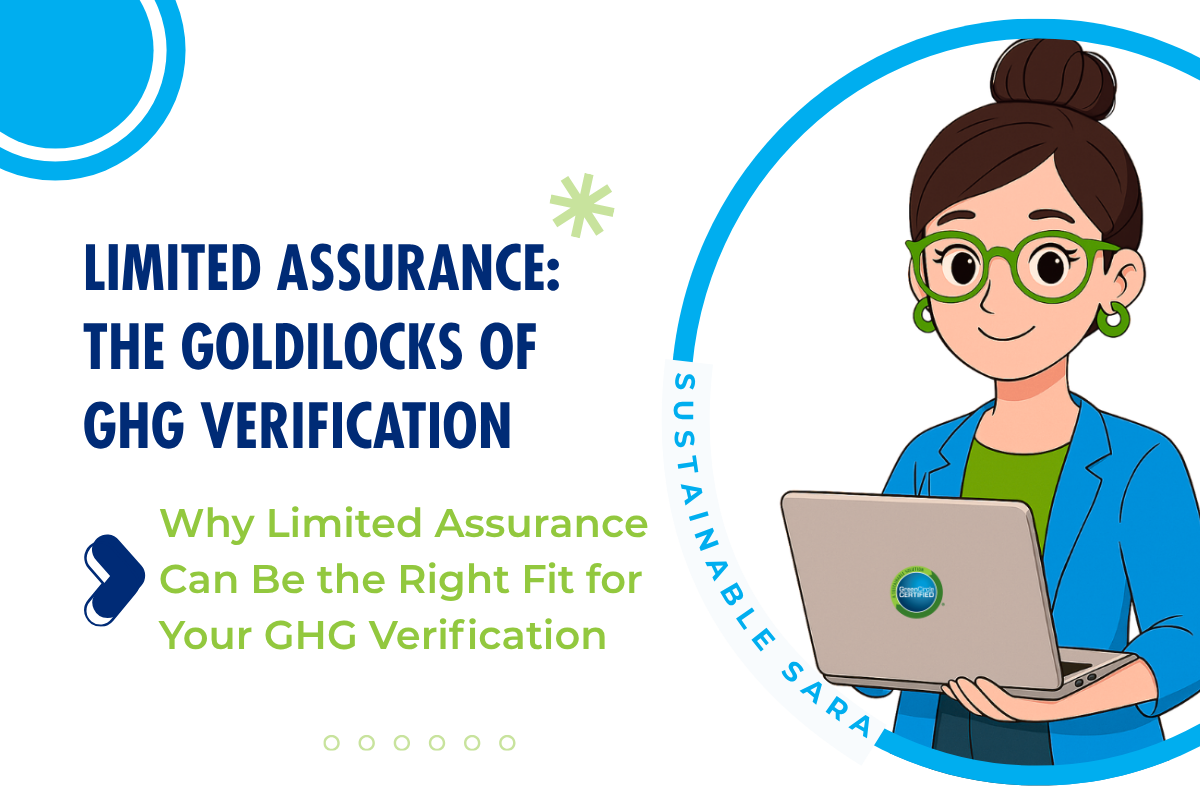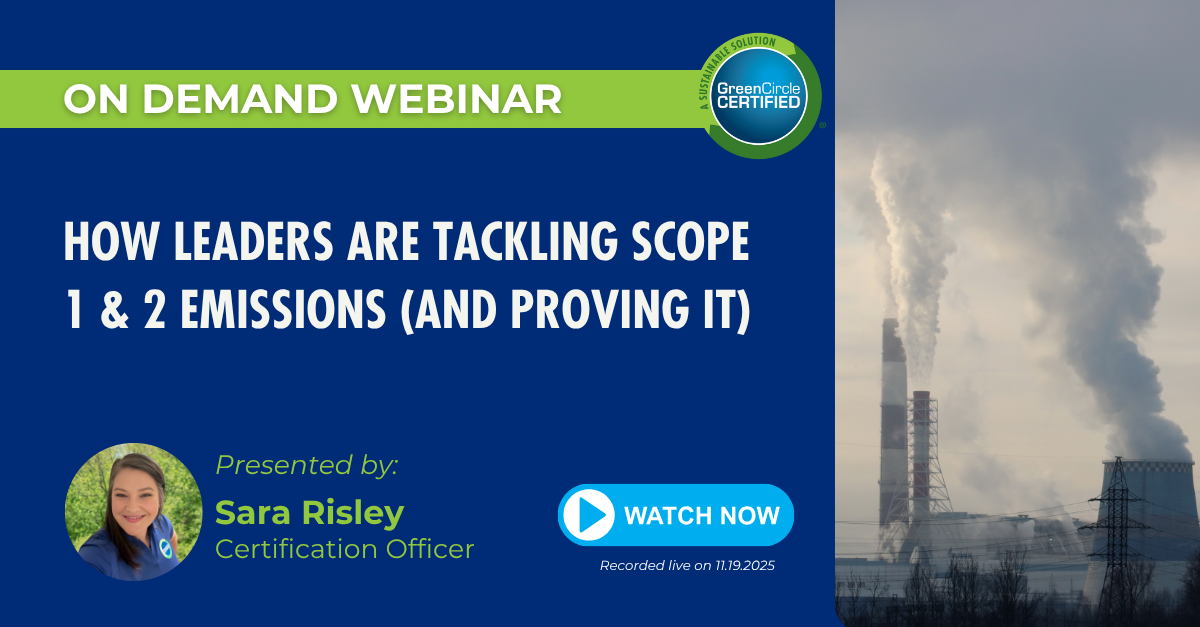Sustainable Sara: Why Limited Assurance Can Be the Right Fit for Your GHG Verification
Let’s be honest. Sustainability data only matters if people believe it.
In 2024, 94% of Russell 1000 companies, including nearly every S&P 500 firm, published sustainability reports, according to research from the Governance & Accountability Institute and the Center for Audit Quality. Yet fewer than half took the next step: independent verification of their greenhouse gas (GHG) data.
That gap matters. With the United States Securities and Exchange Commission (SEC) Climate Disclosure Rule, the EU’s Corporate Sustainability Reporting Directive (CSRD), the Carbon Disclosure Project (CDP), and the Carbon Border Adjustment Mechanism (CBAM) reshaping corporate expectations, credible greenhouse gas (GHG) verification has become a business necessity for companies serious about ESG performance and environmental transparency.
It is not only a business necessity, but also quickly becoming a regulatory expectation in the United States. State-level climate disclosure policies are accelerating, with California taking the lead through SB-253 and SB-261, which require large companies to report their emissions beginning in 2026. Other states, including New York and Illinois, have introduced similar bills that would mandate public reporting of Scope 1, 2, and 3 emissions if adopted.
Meanwhile, states such as Colorado, Washington, and Oregon continue to expand sector-specific emissions reporting and are evaluating broader corporate climate accountability measures. This emerging patchwork of requirements highlights the need for accurate, independently verified, and audit-ready GHG inventories. Limited assurance verification provides the rigor, transparency, and defensibility organizations need to meet evolving state expectations and prepare for future mandatory disclosures.
Without verified data, your sustainability reporting is vulnerable to greenwashing claims, reputational risk, and potential regulatory penalties.
This is where Limited Assurance Verification comes in. Think of it as the “just right” balance for GHG verification — robust enough to earn regulators’ and investors’ confidence yet streamlined enough to keep your reporting cycle on track. It’s the most strategic way to maintain data integrity, build stakeholder trust, and stay audit-ready without overcomplicating the process.
Limited vs Reasonable Assurance
Think of GHG Verification as a wellness check for your emissions data.
Limited Assurance is your routine physical. It involves document review, sampling, and analysis delivering a credible, audit-ready result with lower cost and effort. You gain confidence that your emissions data can withstand professional scrutiny, without the extensive deep dive required for full data verification.
Reasonable Assurance, on the other hand, is the full diagnostic scan. It involves a much deeper level of scrutiny, including more extensive review procedures, site visits, and greater internal resource commitments. It’s exhaustive (and far more expensive) best reserved for when regulators or investors explicitly require it.For most organizations, Limited Assurance GHG Verification is the right fit. It satisfies key frameworks like the SEC, CSRD, CDP and CBAM, and state level climate disclosures like CA SB 253, providing the credibility stakeholders expect without the heavy lift of full-scope Reasonable Assurance.
The Global Standard for GHG Verification
Across industries, sustainability leaders are turning to third-party Greenhouse Gas Verification Limited Assurance because it delivers measurable results:
✅ Enhanced ESG performance: improved ratings and easier investor access
✅ Streamlined processes: data collection and reporting become standardized
✅ Cost efficiency: strong verification at a fraction of the time and expense
✅ Strengthened brand reputation: reduced greenwashing risk and increased credibility
✅ Audit-ready confidence: defensible results for investors, customers, or regulators
Sara Says: Limited ≠ Lesser
Limited Assurance is not “light” verification. It’s right-sized verification.
You still get expert review, sampling, data tracing, and analytical testing. It’s simply focused on what matters most, not every single kilowatt-hour.
In verifier-speak, Limited Assurance means “nothing has come to our attention indicating a material misstatement.” In plain English? Your numbers hold up, and your stakeholders can trust them.
Join the Conversation
When your Scope 1 & 2 emissions are verified, opportunity opens up. Manufacturers gain an edge in securing contracts with customers who expect credible sustainability data. Retailers strengthen supply chain transparency, and exporters stay market-ready under the voluntary frameworks like CDP and CBAM and state level regulations.
If you’re unsure which path fits your goals, join me for this on demand webinar where I’ll share how leaders are tackling scope 1 & 2 emissions and proving it. You’ll learn:
The biggest complexity and pressure points around Scope 1 & 2 emissions
A step-by-step look at GreenCircle Certified’s GHG verification process
Real-world examples of proven results beyond regulatory compliance
Insights and live Q&A with our certification team
About Sustainable Sara
Sustainable Sara is GreenCircle Certified’s in-house certification officer and your go-to source for navigating sustainability claims, audits, and emissions reporting. She’s deeply knowledgeable, fiercely passionate about environmental integrity, and believes that every company — no matter the size — can make credible, verifiable sustainability progress.
Connect with Sara at SustainableSara@greencirclecertified.com
Be Part of Our Inner Circle
Be the first to get new content, expert tips, and industry updates in your inbox.
We respect your privacy and will never share your information. Unsubscribe anytime.





